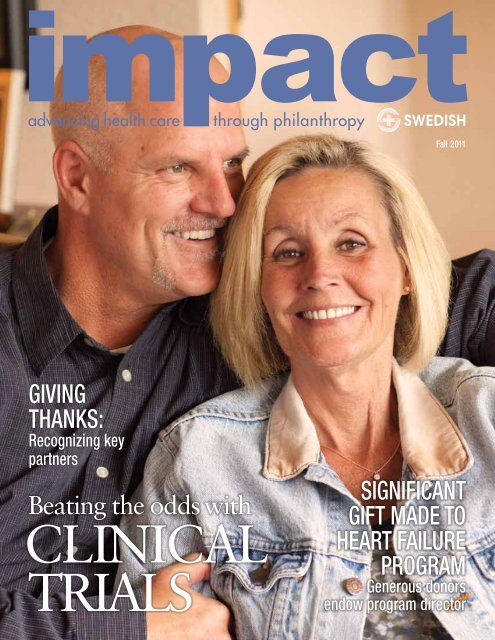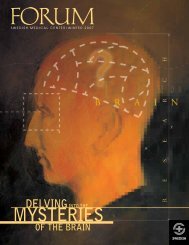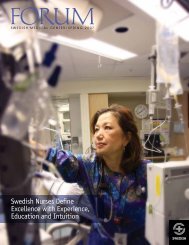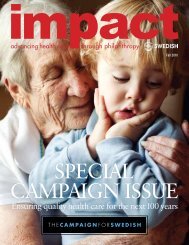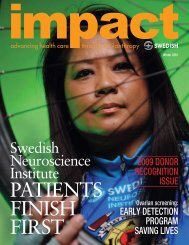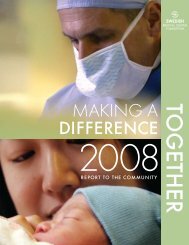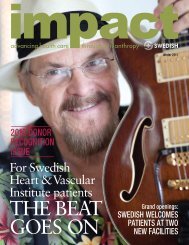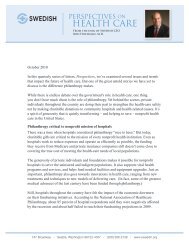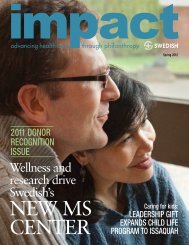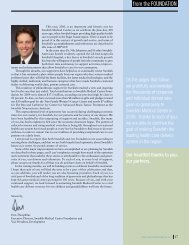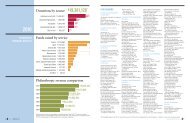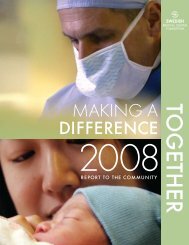Fall Edition - Swedish Medical Center Foundation
Fall Edition - Swedish Medical Center Foundation
Fall Edition - Swedish Medical Center Foundation
- No tags were found...
You also want an ePaper? Increase the reach of your titles
YUMPU automatically turns print PDFs into web optimized ePapers that Google loves.
<strong>Fall</strong> 2011from the CEOLeading the way regionallyin our national health-care crisisThese are some of the most challenging times inour country’s history for both health care and theeconomy. As greater Seattle’s largest nonprofit provider,we believe it is <strong>Swedish</strong>’s responsibility to guidethe region through these difficult times and presenta local solution to the nation’s health-care crisis.<strong>Swedish</strong> is proud to lead the way in partnershipwith Providence Health & Services. Recently, bothof our boards approved an innovative plan to joinforces and form a new integrated health system toserve Western Washington. There are still many detailsto be worked out, and the affiliation is pending regulatory review. But whenfinalized, our new system will dramatically improve health care in the regionby allowing us to coordinate care seamlessly for patients from Centralia toSeattle to Everett.The proposed affiliation will ultimately mean better clinical outcomes forpatients at lower costs for government payers, insurers and employers. It willalso increase access to health care for underserved populations and the uninsured.Combined, Providence and <strong>Swedish</strong> already provide $205 million inuncompensated care and other community benefits in Western Washington.Imagine how much more we could do working together. You can read moreabout this bold new partnership in this issue of IMPACT.Part of our role in the community is to serve as a beacon of hope forpeople facing serious illness. One way we achieve this is through an activeclinical research program that allows us to give patients access to promisingnew treatments. I invite you to turn the pages of this issue of IMPACT tolearn more about the important and groundbreaking work that our investigatorsare undertaking on behalf of our patients.Philanthropy plays a vital role in clinical research at <strong>Swedish</strong>, and ourannual Women’s Wellness Luncheon is one example of that. Thank you toeveryone who attended the October luncheon. Together, you raised more than$282,000 for cancer research, and we are deeply grateful for your support.Thanks to the generosity of many individuals in the community, <strong>Swedish</strong>has had a profound impact on the health of Western Washington for 101years, and with your continued support, we look forward to making an evenbigger difference for many more years to come.Warmest regards,impactadvancing health care through philanthropy<strong>Swedish</strong> <strong>Medical</strong> <strong>Center</strong><strong>Fall</strong> 2011EDITORDESIGNERFEATURE WRITERCONTRIBUTINGWRITERSFEATUREPHOTOGRAPHERCONTRIBUTINGPHOTOGRAPHERSVolume 3, Issue 3Lindsay HopkinsAngela Bogdanovich TurkJennifer SchaeferColleen BromenMarnie FoustGaynor HillsBob HinckEllen KuoRandy MannJennifer NolteKate PurcellRosanne Olson,Rosanne Olson PhotographyBen VanHouten, VanHoutenPhotography, Inc.Craig Larsen Photography<strong>Swedish</strong> <strong>Medical</strong>Photography and VideoJerome Tso PhotographyThor Radford Photographyimpactadvancing health care through philanthropyGIVINGTHANKS:Recognizing keypartnersBeating the odds withCLINICALTRIALSLARGESTSINGLE GIFT FORHEART FAILUREPROGRAMGenerous donorsendow program directorON THE COVER<strong>Swedish</strong> Cancer Instituteclinical trial patient Deborah Dietz,shown with her husband, Eddie,graciously invited us into her hometo share her personal story.Cover photo by Rosanne OlsonFALL2011 3Capsules24Feature6An innovative affiliation<strong>Swedish</strong> and Providence to join forces forimproved health-care delivery in WesternWashingtonWhat’s going on?Plans for new and increased health-careofferings at the <strong>Swedish</strong>/Edmonds campusChanging the futureof cancer careThrough cutting-edge research andclinical trials, <strong>Swedish</strong> gives patientsoptions — and hope<strong>Foundation</strong>NewsFor additional content and information on waysto give, visit us at www.swedishfoundation.orgTo receive our newsletter with information about<strong>Foundation</strong> news and events, register online atwww.swedishfoundation.org/newsletter-signupTo learn more about The Campaign for <strong>Swedish</strong>,visit www.campaignforswedish.orgCONTENTSwww.facebook.com/swedishmedicalcenterwww.twitter.com/swedishwww.youtube.com/swedishseattleAt the heart of the matterGenerous donors Bob and Pattie Arnold endow newmedical director position for Heart Failure program1416Hitting the streets to fightovarian cancerCelebrating record support and team participation at the2011 SummeRun & WalkSaying thank youDonor Recognition Awards recognize key individuals andcorporations for their contributions to our community<strong>Swedish</strong> clinical trialshave allowed cancer patientDeborah Dietz to continuefocusing on what truly matters:home and family.Page 6Rod Hochman, M.D.President and CEO<strong>Swedish</strong> <strong>Medical</strong> <strong>Center</strong>Welcome to <strong>Swedish</strong> <strong>Medical</strong> <strong>Center</strong>’s IMPACTmagazine. This publication is designed toprovide you with the latest information about<strong>Swedish</strong> services and events, health care andmedical topics, and the activities of the <strong>Swedish</strong><strong>Medical</strong> <strong>Center</strong> <strong>Foundation</strong> and its supporters.IMPACT is published as a community serviceby <strong>Swedish</strong> <strong>Medical</strong> <strong>Center</strong>. Any questions orcomments may be addressed to Lindsay Hopkins,editor, <strong>Swedish</strong> <strong>Medical</strong> <strong>Center</strong>, 747 Broadway,Seattle, WA 98122-4307.12The faceof courage<strong>Swedish</strong> Legacy PartnerSusun Hosford is adedicated board member,enthusiastic volunteer,and a true champion ofthe Rivkin <strong>Center</strong>IMPACT FALL 2011 www.swedishfoundation.org 1Photo byRosanne Olson
<strong>Swedish</strong> and Providenceto join forcesAffiliation will improve health care for Western Washington.<strong>Swedish</strong> Health Services and ProvidenceHealth & Services recently announcedplans to form an innovativeaffiliation that will improve health-carequality, access and affordability for theresidents of Western Washington. Thisunique affiliation will allow both organizations,which have each served thePuget Sound area for more than100 years, to collaborate to betterdeliver health care to the region whileat the same time maintaining theirindividual identities and heritage.Under the proposed plan, thetwo organizations will form a newnot-for-profit health-care systemthat will include all of <strong>Swedish</strong>’soperations in King, Snohomishand Kittitas Counties and all ofProvidence’s operations in King,Snohomish, Thurston and LewisCounties. Providence will keep theProvidence name and its Catholicidentity, while <strong>Swedish</strong> will keepthe <strong>Swedish</strong> name and remain anon-religious organization.The two not-for-profit organizationsrecently signed a memorandum of understandingand are now working on thedetails of the proposed affiliation. Regulatoryreview and approval of the new operatingarrangement may take some time;until then, the two organizations will continueto operate independently.“Through this unique operating arrangement,we are able to preserve eachorganization’s heritage and local operations,while providing a better and moreaffordable level of patient care acrossboth organizations,” says John Koster,M.D., Providence Health & Services presidentand CEO. “We had to think beyondmerger or acquisition to accomplish this,and this affiliation is really the best ofboth worlds. The shared knowledge andcapabilities of Providence and <strong>Swedish</strong>will benefit our communities for many,many years to come.”“Health care in this country is at acrossroads. Having served the communityfor more than a century, we believe it isour responsibility to lead the region throughthese challenging times. By sharing theresources, best practices and expertise oftwo great institutions, we can address thenation’s health-care crisis at a local leveland create one of the best health-care systemsin the country,” says Rod Hochman,M.D., president and CEO of <strong>Swedish</strong>.One benefit of the affiliation will be acommon electronic health record that willconnect Providence and <strong>Swedish</strong> hospitals,outpatient centers, and doctors’ officesthroughout Western Washington to betterserve patients and help improve their health.In addition, by sharing resources, bothorganizations can make it easier to accesshealth care across the entire range of services— from primary care, specialized care,research, hospice and long-term care.By working together, Providence and<strong>Swedish</strong> can reduce costs by better organizinghow care is delivered. Both organizationswill be able to create improvedmodels for delivering care and approachesto chronic disease management, which inturn will make health care more affordablefor government payers, commercialinsurers, employers and patients.What does this affiliation mean forend-of-life care and reproductive healthservices at <strong>Swedish</strong>? To clarify, there willbe no changes to current practices regardingend-of-life care at <strong>Swedish</strong>.In addition, <strong>Swedish</strong> will continue toprovide abortions on an emergency basis,along with comprehensive women’sservices including family planning andsterilizations in <strong>Swedish</strong> facilities. Nonemergentcases will be performed in aclinic setting operated by Planned Parenthood,which will be established onthe First Hill campus.Both leaders, who are also physicians,believe that each organization’s complementarycommunity service missionswill serve as a strong foundationfor success. “Knowing thatgreater collaboration among providersis the future of health care,<strong>Swedish</strong> had been seeking the rightpartner for a few years,” says Dr.Hochman. “We evaluated manydifferent options. But at the end ofthe day, there was only one partnerthat made sense. Like <strong>Swedish</strong>,Providence is a mission-drivenorganization with a strong commitmentto providing high-qualityhealth care to everyone, includingunderserved populations. It wasimportant to find a partner whoshared that as a core value.”Last year, Providence and <strong>Swedish</strong>provided a combined total of more than$205 million in community benefit inWestern Washington, including $61.4 millionin free and discounted care for thosewho could not afford to pay.“The economic challenges facing ourcities, state and country are daunting andwon’t be any less challenging until webegin to offer innovative solutions,” saysDr. Koster. “Together, Providence and<strong>Swedish</strong> can dramatically impact healthcarecost and access for all who live in thecommunities we serve.”In light of economic challenges, philanthropyhas, and will continue to be,vital to the missions of both organizations.Through this innovative affiliation, Providenceand <strong>Swedish</strong> will maintain their individualfoundations, and they will continueto operate separately. That means gifts madeto the Providence foundations will only goto Providence and gifts made to the <strong>Swedish</strong><strong>Foundation</strong> will only go to <strong>Swedish</strong>. iBob and Pattie Arnold endow newmedical director for Heart Failure programChronic and acuteheart failure patientsto benefit fromgenerous gift.Anew $2 million gift from Bob andPattie Arnold of Seattle will allow<strong>Swedish</strong> to recruit a nationallyrecognizedheart failure specialist to leadthe Comprehensive Heart Failure program.Heart failure is a serious, life-threateningform of heart disease that affectsmore than five million people in theUnited States — 40,000 in the PugetSound area alone — and causes morehospitalizations than any form of cancercombined.“Both Pattie and I are excited aboutthe new Heart Failure program at the<strong>Swedish</strong> Heart & Vascular Institute, andwe feel fortunate to have the opportunityto support such a great institution,”says Mr. Arnold.The Robert M. & Patricia ArnoldEndowed Director for Heart Failure willoversee the integration of the multipledisciplines required to care for chronicand acute heart failure patients throughoutthe <strong>Swedish</strong> system, including specialistsin cardiology and cardiovascular surgery, primary care,emergency medicine and hospital medicine, as well as nursingand home-care providers.The establishment of this endowed directorship marks animportant milestone for the new Comprehensive Heart Failureprogram at <strong>Swedish</strong>. While the Arnold’s gift is the largest singlegift received to date for the program, a total of more than $4.5million from the community has been raised through TheCampaign for <strong>Swedish</strong>. Following are other recent Heart Failureprogram milestones achieved through philanthropy include:• Construction was completed in June on the John L. LockeJr. Heart Failure Clinic on the fourth floor of the James Towerat the <strong>Swedish</strong> Cherry Hill campus. The new outpatient Clinic,named for the $1.5 million gift that launched the Heart Failureprogram, will offer advanced, outpatient care for patients withBob and Pattie Arnold’s endowment is the largest single gift to date for the Heart Failure program at <strong>Swedish</strong>.chronic heart failure, including diagnostics, treatment, casemanagement, patient monitoring and education and supportservices to meet a broad range of needs for chronic heart failurepatients. The Clinic will be the administrative base for theHeart Failure program throughout the <strong>Swedish</strong> system.• <strong>Swedish</strong> has established a multidisciplinary Heart Failuresteering team to review care plans of high-intensity patientsfollowing hospital discharge, beginning later this year. In addition,a new patient support and education program, EmmiSolutions, was launched in mid-September which will encourageheart failure patients to become active partners in treatingtheir disease.To learn how you can support the Heart Failure program,please contact Randy Mann at randy.mann@swedish.org or(206) 386-6791. i2 IMPACT FALL 2011 www.swedishfoundation.org 3
Planning for the future:New developments at <strong>Swedish</strong>/EdmondsPlans are underway for a new cancer care facility on the <strong>Swedish</strong>/Edmonds campus, depicted here in an architectural rendering.Expansion of cancer care and improvements toemergency and birthing services part of the planning currently underway.In September 2010, <strong>Swedish</strong>/Edmondswas established through an innovativepartnership between Seattlebased<strong>Swedish</strong> Health Services andStevens Hospital in Edmonds.This partnership allows <strong>Swedish</strong>/Edmonds to combine resources and talent,manage costs more effectively, providegreater value to patients by improvingcare-delivery models, and reduce waste.In addition, <strong>Swedish</strong> has committed tomaking significant investments in advancedmedical and information technology atits Edmonds campus.Over the past year, many key needs havebeen identified to ensure increased healthcareofferings for the community, andnumerous new developments are alreadyunderway. For instance, the Edmondscampus is in the process of integratinginto <strong>Swedish</strong>’s Epic electronic health recordssystem, which will make it easierfor patients to manage their health careand for physicians to provide it. The Epicnetwork offers a powerful set of secureonline services such as transmitting labresults, emailing doctors, making appointmentsand paying bills.In June 2011, David Jaffe, who servedas executive director and CEO of Harborview<strong>Medical</strong> <strong>Center</strong> for 16 years, signedon as the interim chief administrativeofficer for the Edmonds campus. Daviddecided to accept this leadership rolebecause of the exciting opportunities onthe horizon at <strong>Swedish</strong>/Edmonds.Planning is currently underway fordevelopments to the campus over thenext 10 years. These plans include anexpanded cancer center, improvementsto emergency services, increased birthingservices, and an expansion of critical careRendering provided by Perkins+Willbeds. The goal is to provide patients theoptimum environment that best supportstheir health-care needs.Expanding cancer care close to homeProviders of advanced cancer care forpatients in north Seattle and south SnohomishCounty have a long history ofclose collaboration. The <strong>Swedish</strong> CancerInstitute (SCI), Puget Sound Cancer<strong>Center</strong>s (PSCC), and other local cancercare providers affiliated with <strong>Swedish</strong>/Edmonds cared for more than 2,600patients last year.Through a growing partnership withPuget Sound Cancer <strong>Center</strong>s, the physiciansand administrative staff in thecancer program are working to identifyways to offer patients from surroundingcommunities increased services andimproved access to the most advancedand comprehensive cancer care close totheir homes. As a result of this collaborativeplanning process, <strong>Swedish</strong>/Edmondsis moving forward with numerous improvementsin facilities, technologies and servicesfor treating cancer patients.The plan for expansion at <strong>Swedish</strong>/Edmonds includes the construction ofa new, 16,000 square-foot cancer carefacility. The medical oncology physicians’suite and chemotherapy treatment centerwill move to this new location. The newfacility will allow for state-of-the-art technologyupgrades, larger exam rooms andinfusion spaces, and enhanced privacy andcomfort for patients and their families.This expansion will also include furtherdevelopment of the cancer resourcecenter to provide patient- and familycenterededucational activities, socialservices, meeting rooms for patient supportgroups, and space for other specialistsand alternative providers related to thecancer program.Later phases include exciting newchanges in the existing cancer facility.The first floor will accommodate a newlinear accelerator (LINAC) – a technologycommonly used for cancer radiationtreatments. A LINAC works by deliveringa uniform, high energy, X-ray dose tocancer tumors. The precision and accuracyof the X-ray dose allows for cancercells to be destroyed, while sparing surroundingnormal tissue.The expanded center will provide amore seamless and personalized experiencefor patients and families. We expectto complete the project in spring 2012.Philanthropic support from the communitywill play an important role inthis project, and the <strong>Swedish</strong>/EdmondsImagine Gala, held on November 18th,helped raise critical funds for the newcancer care facility. iMake animpactGenerous community support plays an integralrole in helping us expand programsand services at the <strong>Swedish</strong>/Edmondscampus. For more information aboutfeatured fundraising objectives or howyou can support these or other projects,please contact Kate Purcell, director, majorgifts at kate.purcell@swedish.org or(206) 386-3194.Healing through art:A community partnershipTo highlight how art provides ahealing environment, <strong>Swedish</strong>/Edmondshas reached out to local artists to sharetheir work with patients and the community.Art from 20 local artists is partof a rotating collection currently ondisplay throughout the campus.“Art has long been recognized forits role in the healing process,” says DavidJaffe, interim chief administrative officerat <strong>Swedish</strong>/Edmonds. “The art collectionat <strong>Swedish</strong>/Edmonds is a resultof the unique partnership between thehospital and the art community.”<strong>Swedish</strong> has been integrating art aspart of the healing environment since<strong>Swedish</strong> Art Committee member Janette Turner,artist Mona T. Smiley-Fairbanks, and <strong>Swedish</strong>/Edmonds interim CAO David Jaffe.the Seattle art collection originated inthe 1960s. Over 2,000 pieces exist inpublic spaces across its campuses.Funding comes from donations, gifts tothe Art Endowment Fund, and a smallpercentage from the construction budgetsof new projects and remodeling.One of the Edmonds artists, MonaT. Smiley-Fairbanks, is very pleased. “I’mglad to see <strong>Swedish</strong>/Edmonds is supportingthe local arts community and acknowledgingthe healing nature of art.”4 IMPACT FALL 2011 www.swedishfoundation.org 5
“My time withmy family is soimportant to me.I feel fortunate to beable to watch mygrandchildrengrow up.”Deborah Dietz:wife, mother, grandmother and<strong>Swedish</strong> clinical trial patientDDeborah’s cancer was discoveredduring a routine medical exam in Everett,during which her physician found thather blood count was off. Severely anemic,she was advised to take an iron pill threetimes a day and was sent home. After amonth, when her blood count didn’t improve,her doctor referred her to anotherarea physician. “He did a scan on me andfound the Stage IV colon cancer,” remembersDeborah. “I was shocked, because Ididn’t really have any symptoms.”There are four stages of colon cancer,with stage IV being the most advancedbecause it has often spread to other organs.In Deborah’s case, the cancer had invadedher liver. “After delivering my diagnosis,the doctor told me to go home and putmy affairs in order because there wasnothing he could do for me,” she says.“I turned whiteas a sheet andbroke out in asweat. I didn’tknow what tosay or do.”Breaking thenews to herhusband, Eddie,and two adultchildren wasdifficult — butthe familyagreed theyweren’t goingto give up hope. One of Eddie’s co-workershad been treated for colon cancer at<strong>Swedish</strong> <strong>Medical</strong> <strong>Center</strong>, and through her,the Dietzes were referred to colorectalsurgeon Steven Medwell, M.D. “I calledDr. Medwell that Friday, and on Mondaymorning, July 3, we had an appointmentwith him,” says Deborah.At the appointment, Dr. Medwell“read my scan, then sat with me andheld my hand. He asked me what I wasdoing the next day, the Fourth of July,and said he would meet me in the morningfor surgery.” For the first time sincebeing diagnosed, Deborah felt a senseof relief. She was comforted by the factthat a physician was putting a treatmentplan into action.Dr. Medwell was the first of many<strong>Swedish</strong> physicians and caregivers togive Deborah this feeling of comfort andhope. Another was Philip Gold, M.D.,an oncologist and director of cancerresearch at the <strong>Swedish</strong> Cancer Institute(SCI). “When I woke up after surgery,Dr. Gold was at my bedside,” saysDeborah. “He told me he’d be with meall the way, and that there would alwaysbe a plan for me at <strong>Swedish</strong> and throughhis research. That made me feel wonderful.Knowing he had a direction helped a lot.”Two grueling years followed, duringwhich Deborah received 51 hours ofchemotherapy every other week. Sheunderwent multiple liver surgeries aswell as surgery to remove canceroustissue that had metastasized to her lung.To date, she has had a total of seven operationsrelated to her cancer diagnosis.“The first two years were reallytough,” says Deborah. “My husbandliterally had to pick me up off the ground,rub my back, fix my meals and takecare of me.”Eventually, Deborah reached thelimit of theamount ofchemotherapyshe couldundergo, andin mid-2009,Dr. Goldintroducedthe possibilityof embarkingon a series ofclinical trials,which give patientsaccess topromising newmedications and procedures before theyare widely available. Without hesitation,Deborah agreed.“Deborah is a very courageouswoman,” says Dr. Gold. “She had gonethrough all of the commercially availabledrugs for the treatment of her cancer. Butwhen they stopped working, she wasn’tcontent just to stop treatment. She was apatient who wanted to have choices, wantedto have options, wanted to have hope.”“I didn’t have any reservations aboutparticipating in the trials,” says Deborah.“I had complete faith in <strong>Swedish</strong>’s doctors,nurses and other team members. I alsowanted my experience to benefit othercancer sufferers by helping to makethem healthy.”Clinical trials typically have threedistinct phases — I, II and III — accordingto the stage of development of the drug,with Phase III being the most advanced.Clinical trial patient Deborah Dietz puts family first, as thisframed collection of photos in her living room attests.In October 2009, Deborah participatedin Phase II research, which “workedgreat,” she says. “It helped me feelsteadier.” The following February,she began taking a Phase III drug, “whichworked even better.” And this past April2011, Deborah became the first personin the United States to be enrolled ina new Phase I study, with promisingresults. Within the first few weeks oftreatment, her level of a tumor markercalled CEA had dropped from 35 to amuch-more-normal 5.“The clinical trials — the third onein particular — changed my life,” saysDeborah. “The things that I do havegotten so much easier. I still have symptoms,but very few compared to before.”On a typical day, Deborah, a formerassistant daycare director, might go for awalk with her husband, work in the yard,or play with her four grandchildren. Herfamily loves RVing on both sides of themountains and spending time at the beach,and her son is planning a wedding. Deborahis currently learning how to play golf.“My time with my family is so importantto me,” says Deborah. “I feel fortunateto be able to see my grandchildren grow up.”She adds, “Without <strong>Swedish</strong>’s cancerresearch program, I wouldn’t be heretoday. Dr. Gold is my hero.”“I just want to do the best I can forDeborah and have her be around with herfamily for as long as possible,” says Dr.Gold. “I want to keep giving her thosechoices and that hope. Patients like tohave options. Patients want to have hope.And clinical research gives them both.”Cancer research at <strong>Swedish</strong>The history of clinical cancer researchat <strong>Swedish</strong> — research that has significantlyimproved the lives of DeborahDietz and thousands of other patientssuffering from cancer — dates back fourdecades. In the early 1970s, Seattle-nativeSaul Rivkin, M.D. became <strong>Swedish</strong>’ssecond medical oncologist and wasinstrumental in early efforts to establishthe medical center’s cancer institute asa national leader. In addition to writinginnovative protocols, including onecreated in 1974 that is still being usedtoday, he initiated <strong>Swedish</strong>’s participationin the Southwest Oncology Group(SWOG), one of the largest NationalCancer Institute-supported cooperativegroups for cancer clinical trials in theUnited States. <strong>Swedish</strong> has acted as theMake an impactFEATURESince its founding in the 1970s, <strong>Swedish</strong> Cancer Institute’s researchdivision has grown steadily, making <strong>Swedish</strong> one of the leading clinicaltrial sites in the western United States. Over the years, treatments, devicesand technologies developed and used by <strong>Swedish</strong> investigators inclinical research have greatly contributed to making <strong>Swedish</strong> a placewhere patients and their families know they will be able to receivethe most advanced cancer care available in their own community.Patients have always come first at <strong>Swedish</strong>, and the <strong>Swedish</strong> Cancer ResearchDivision operates under two guiding principles:Giving cancer patients more choices for treatment. Most cancers are extremelycomplicated diseases that can affect patients in many different ways. The broadprogram of clinical cancer research conducted at the <strong>Swedish</strong> allows our caregiversto choose from an array of devices, therapies and technologies. These caninclude both standard practices and, when standard treatments aren’t available,investigative approaches. For each patient, the issues involved in deciding whichtreatments to choose are carefully explained, and the goal is always to providepatients who have been diagnosed with cancer the best treatment and outcomespossible.Bringing science to the bedside. At <strong>Swedish</strong>, treating cancer means diagnosingat the earliest stage possible, and quickly identifying the best ways to treat andrestore health. Patients who choose to enroll in a clinical trial or receive aninvestigational treatment for their cancer remain under the direct care of theirpersonal physicians. This focus on maintaining <strong>Swedish</strong>-style, patient-centeredcare for those participating in clinical investigations is a hallmark of the <strong>Swedish</strong>Cancer Institute.Philanthropic partnerships are integral in allowing <strong>Swedish</strong> to have an activeand dynamic cancer research program. Generous individual and corporate donorsgive our physicians opportunities to develop their understandings of cancer, toshare their knowledge with others, to participate in a stimulating, internationalscientific effort and, most of all, to be able to give their patients the kind of carethey deserve and need.Your generosity truly makes a difference in the fight against cancer. If youwould like to learn more about how you can support <strong>Swedish</strong>’s cancer researchprogram through an outright gift, a pledge, or a legacy gift, please contact EllenKuo, director, major gifts, at ellen.kuo@swedish.org or (206) 386-6928.8 IMPACT FALL 2011 www.swedishfoundation.org 9
FEATUREcoordinating center for SWOG’s researchactivities in the Northwest since 1977,and the medical center’s collaborationwith other area institutions — includingFred Hutchinson Cancer Research <strong>Center</strong>,the University of Washington and GroupHealth Cooperative — makes <strong>Swedish</strong>the largest SWOG clinical-trials site inthe country.“SWOG provides our physicianswith opportunities to collaborate withdoctors throughout the country in determiningthe newest and latest treatmentsavailable to patients and tries to bringthem back home to <strong>Swedish</strong>,” says Dr.Gold. “Our patients have access to trialsacross a broad range of cancer types,including breast, colon, prostate andmany, many others. These trials can makelife for cancer patients much more comfortable,and even save their lives.”“When I came to <strong>Swedish</strong> many yearsago, there was a void because the medicalcenter didn’t have a cancer program,”reflects Dr. Rivkin. “There were only avery few treatments for cancer available.Now, the amount of treatments has mushroomed,and we have a lot of choices.It’s really exciting to see that we’re makingbig progress in cancer care.”“Cancer is the worst word in theworld,” says Dr. Rivkin. “But it doesn’thave to mean death — it can mean life.It means hope. I’ve seen it with breastcancer. When I started here, 30 percentof the women would die of breast cancer,and now it’s only 10 percent. And that’sthrough clinical research. There’s been ahuge amount of progress, and it’s growingevery year.”Winning the fight against cancerThe <strong>Swedish</strong> Cancer Institute’s researchprogram has grown and diversifiedsince the 1970s, but its goals remains theSpotlight: Hank Kaplan, M.D.same: to test approaches to preventingcancer, detect various types of cancer invery early stages, find new treatments ormore effective combinations of treatments,and improve the quality of life for cancerpatients. As has been the case since thebeginning, clinical trials are the mosteffective way progress is being made.To help achieve its goals over theyears, SCI’s research program has developedaffiliations and collaborations withmany other institutions — as well aspharmaceutical and biotech companies— locally, nationally and internationally.Clinical trials are offered at <strong>Swedish</strong>through a variety of organizations, includingthe Southwest Oncology Group, theNational Cancer Institute’s Cancer TrialsSupport Unit, the American College ofSurgeons Oncology Group, the RadiationTherapy Oncology Group, the NationalSurgical Adjuvant Breast and BowelProject, and <strong>Swedish</strong>’s own physicianinitiatedresearch.In addition to improving patients’lives, research efforts also benefit physiciansby giving them opportunities todevelop new ideas, share knowledge,and participate internationally in a highlystimulating scientific environment dedicatedto the fight against cancer.“I love my job at the <strong>Swedish</strong> CancerInstitute,” says Dr. Gold. “Not only do Iget to directly care for my patients, but Ialso get to write and design clinical trials,which keeps me intellectually stimulatedin my job. And I don’t have to send mypatients anywhere else for any medicaltherapy. It can all be done right here at<strong>Swedish</strong> <strong>Medical</strong> <strong>Center</strong>.”Innovative clinical trialsOver the decades, the <strong>Swedish</strong> CancerInstitute has helped facilitate hundredsof clinical trials that have resulted in theHank Kaplan, M.D. servesas the current director of medicaloncology at the <strong>Swedish</strong> CancerInstitute, and administers theKaplan Cancer Research Fund at<strong>Swedish</strong> <strong>Medical</strong> <strong>Center</strong> <strong>Foundation</strong>.Activities of the KaplanResearch Fund have continued tofocus on two areas — treatmentfor hematologic malignancy andbreast cancer — and the fund hasbeen supported by over 2,760gifts since its inception in 1993.availability of several new cancer drugs,such as Taxol and Carboplatin, whichare now standard-of-care treatments.And the innovation continues: last year,for instance, SCI opened a new, ongoingPhase I trial for hepatocellular cancerand treated the first person in the worldwith the new drug.Another example of SCI’s work is itscreation of an extensive Breast ResearchRegistry, a unique database that housesinformation on more than 12,000 breastcancercases, to which more than 800 newcases are added annually. The intent ofcompiling this data is to allow physiciansto evaluate it, looking for variables, similaritiesand statistical patterns that mayindicate what has worked for certaintypes of cancer and certain patients inthe past. Ultimately, these insights mayshow new ways to improve outcomesfor patients with breast cancer.Another focus of the <strong>Swedish</strong> CancerInstitute is developing what are knownas “targeted therapies” — drugs that arevery specific to particular cancer cellsand usually result in fewer side effects.“We now know how tumors grow,”says Dr. Rivkin. “For patients with cancersthat can spread to the bones — lungand breast, for example — we have drugsthat prevent the formation of cancer cellsin the bones. Exciting new developmentslike this have come about in just the pasttwo or three years.”Another example of targeted therapyDr. Rivkin mentions is a recently-developedtreatment for certain tumors thathave high levels of folic acid. “We’velearned how to connect drugs to thefolic-acid molecule. The drugs go rightto the tumor without hurting the body,which is fantastic. They are getting betterand better every year.”“I could not even begin to do my jobwithout the extraordinarily talented nurses,compassionate social workers, and an entire hospitaldedicated to quality. The generous community supportto my research is also a great gift. Without theirphilanthropy, the physicians and staff at <strong>Swedish</strong>would not be able to continue their pursuit in findingthe most effective and safest treatments for our patients.”Hank Kaplan, M.D.Similarly, new radiation-oncologytechniques are also becoming moretargeted, as researchers discover newways to deliver radiation therapy withmuch less damage to surrounding tissues.“The biggest difference I’ve seen in cancersurgery is that we’ve learned how to gainmore with less — to remove less tissuebut get a better result,” says Dr. Rivkin.“Surgical procedures are much morefocused and targeted. Patients experienceless deformity, less distortion, andless loss of function because of researchin the surgical area.”“Some of the equipment developedthrough our advanced radiationtherapyresearch program has beeninstrumental in changing the course oftreatment for patients,” says Dr. Gold.“Several of these radiation-oncologytechniques aren’t available anywhereelse in the country.”He adds, “Patients come from allover to participate in our research trials.They come from throughout the Northwest,Alaska, California and otherparts of the country. Trials are veryimportant at <strong>Swedish</strong> in terms of bringingnew patients into the system andkeeping us at the frontier of clinicalresearch.”Making a differencein the lives of cancer patientsCancer touches nearly everyone.“It’s a really common disease that affectsabout a third of us in our lifetimes,”says David Beatty, M.D., a breast surgeonand the director of research andeducation for <strong>Swedish</strong>’s breast cancerprogram. “Most of us will be confrontedby cancer, or have a really close familymember who has it. And to provide thebest care, you’ve got to be out thereseeking it, looking for it, asking questions,turning stones, inquiring. That’show you find the very best.”Of course, it takes financial resourcesto fund new research and clinical methods,and much of the funding for the <strong>Swedish</strong>Cancer Institute’s research departmentcomes from philanthropy.“Some costs of <strong>Swedish</strong>’s clinicalresearchprogram are provided byindustry,” says Dr. Gold. “We receivefederal funding from the National CancerInstitute as a large participant in theSouthwest Oncology Group. We receivemoney for commercial clinical trials whenwe participate in a nationwide studythat’s being done by a pharmaceuticalcompany. However, we remain extremelydependent on donors for support. Thesefunding sources only cover a fractionof our actual expenses. In order to keepgoing with this large research program,we are completely dependent on privatedonations.”Philanthropy supports a wide variety ofexpenses, such as the salaries of supportstaff including nurses, research coordinatorsand regulatory-affairs personnel.Financial support from donors has alsohelped create SCI’s Compassionate CareProgram, which provides support forphysicians to gain access to new, experimentaltreatments for patients, even ifthe patients don’t qualify for a researchstudy because of strict eligibility criteria.When asked about future goals forthe <strong>Swedish</strong> Cancer Institute, Dr. Goldsays he has an ambitious global visionfor where he’d like to see cancer researchgo in the next several years. “We need tokeep offering our patients the latest treatments.We need to increase the amountof clinical research being done at our satellitesites, such as Issaquah and Edmonds.We need to give patients in the entireregion access to these newer therapies,and this is going to take a lot of effortand a lot of infrastructural support.”He remarks, “With continued philanthropicsupport and community partnerships,we will be able to continue todevelop new protocols, treatments andtechnologies, and continue to give patientshope and choices and all the things thatthey really want in a cancer center.”For cancer patients such as DeborahDietz, hope is what gets them out of bedin the morning.“My husband and I focus on thepositive each and every day — whatwe’re going to do and the things we’regoing to accomplish,” says Deborah,who’s only spent a single day in bedsince being diagnosed. “We don’t lookat anything negatively because ofthe cancer, because I believe I willbe over this. I’ve told Dr. Gold fromday one, ‘I’m going to be here. I’ma survivor.’” iJennifer Schaefer is a Seattle-based writer and editor.She can be reached at schaefer.jen@gmail.com.Rosanne Olson is an award-winning photographer,teacher, lecturer and published author. She collaborateswith her fellow humans to tell the truth, beautifully,in her Knowing Portraits practice. To learn more,visit rosanneolson.com.“My husband and Ifocus on the positiveeach and every day —what we’regoing to do and thethings we’re going toaccomplish.”Deborah Dietz10 IMPACT FALL 2011 www.swedishfoundation.org 11
LEGACYHolden Hughes: A NICU miracleJessica Hughes greets Dr. Levine at Holden’s first birthday party.Wonderful care leads togenerous donations for<strong>Swedish</strong> NICU.Holden Hughes proved early onthat he possessed the strengthof spirit to fight, inspire andthrive — traits which he undoubtedlyacquired from his parents,Jessica and Tom.At 18 weeks pregnant, Jessica knewsomething was wrong: “I felt some crampsand went to the hospital. They told me Iwas leaking fluid, and I was put on immediatebed rest.”“The strength and courage of my wifeduring those seven weeks amazed me,”says Tom. “She was determined to keepour baby safe and delay birth for as longas possible.”With the support of <strong>Swedish</strong>’s Antepartumunit staff, her family and friends,Jessica made it to 25 weeks and on June 14,2010, their baby boy was delivered viacesarean section.“This case was truly unique and special,”recalls Linda Toscano, Holden’sprimary NICU nurse. “We faced a varietyof challenges with Holden, but he keptpulling through after each scare andproved to be a fighter,” says Linda. Afterspending more than 138 days in the NICU,Holden was finally ready to go home.“Everyone — from the doctors andnurses to the environmental services staff— was amazing. The valet placed ‘We’llMiss You’ notes all over the car, and evenbought us balloons with their own money.It was an incredible surprise and we knewwe would never forget the care we receivedat <strong>Swedish</strong>.”A year later, when planning Holden’sfirst birthday, the Hughes thought of away to give back. In lieu of gifts, theyasked their friends and family to makedonations in support of <strong>Swedish</strong>’s NICU.“We realized this was the only way thatwe could say ‘thank you,’ as well as helpother families who have to go throughwhat we did.”With over 200 guests in attendance,including members of <strong>Swedish</strong>’s medicaland nursing staff who cared for Holdenduring his first few months, a joyous celebrationwas held at the Seattle Tennis Club.Jessica’s obstetrician, Bob Levine, M.D.,who came into the hospital on his night offat 1:33 a.m. to deliver Holden, also joinedin to celebrate the very special birthday.“There were so many people whosupported us during this past year’s journey.Not only did we want to say thankyou, but we also wanted to give everyonean opportunity to see for themselves howhealthy and strong Holden is today.”The event raised more than $18,000for the NICU and although Holden ishealthy and thriving, the Hughes’ spiritof generosity continues on behalf of<strong>Swedish</strong>. iIn 2010, more than $1.5 million wasraised from generous donors to expandthe <strong>Swedish</strong> NICU to the third floor,South Tower. Tom and Jessica Hugheswant to thank the community for thisgift, as their son was privileged to beone of the first patients in this new unit.Commitmentto a causeA decade after her initial diagnosis ofovarian cancer, Susun Hosford is now anenthusiastic volunteer and championfor the Rivkin <strong>Center</strong>.Susun Hosford is a dynamic woman with a variety ofinterests and passions, and is equally at home whether discussingthe finer points of strategic marketing, why steelbicycles are superior to the newer carbon frames, or what itmeans to be courageous in the face of a serious health diagnosis.Nothing about Susun’s energy or personality betray that she liveswith a life-threatening, but in her case, managed disease.Ten years ago, Susun was one of the more than 230,000women worldwide who are annually diagnosed with ovariancancer. Like many affected by this disease, Susun suffered nomajor symptoms and it went undetected during routine screenings— a significant reason why ovarian cancer has the lowestsurvival rate of any gynecological cancer.Susun is quick to recognize the seriousness of her disease —but equally quick to acknowledge the incredible role <strong>Swedish</strong>has played in her early diagnosis and treatment. “My preferredhospital is <strong>Swedish</strong>. There is a true sense of caring and communityamong the patients, doctors, and clinical staff. Plus, I canwalk into any campus, clinic or emergency room and they canpull up my records. That’s a very powerful thing.”Determined to be an active voice in the community, Susunserves on the board of the Marsha Rivkin <strong>Center</strong> for OvarianCancer Research, is a champion of the SummeRun & Walk,and is committed to causes involving education and ovariancancer research.In 2010, Susun made another significant commitment to<strong>Swedish</strong> in the form of a bequest to the Rivkin <strong>Center</strong> — makingher a <strong>Swedish</strong> Legacy Partner. When her attorney recommendedMake an impactSusun Hosford: passionate supporter of the Marsha Rivkin <strong>Center</strong>.she refresh her will (which had been first drafted after her diagnosis),Susun decided to include a gift as a tribute to women whowill receive an ovarian cancer diagnosis in the future. “WhenI was diagnosed, other women supported and impacted me.Now I want to help others however I can.” Susun recognizesthe importance of empowering the next generation of researchers,believes in the powerful work done by the Rivkin <strong>Center</strong>, andknows that philanthropy plays a vital in its mission to find a cure.Clint Burwell, executive director of the Rivkin <strong>Center</strong>, isgrateful for Susan’s enthusiastic commitment: “Susun’s compassionand her dedication to the research mission of the Rivkin <strong>Center</strong>are evidenced in her legacy gift. We are constantly inspired to domore by her dynamic and passionate leadership on our Board.” iHave you considered making a planned gift to <strong>Swedish</strong>? Legacy gifts can be funded with cash, securities, real estate, or otherassets, and can be crafted to achieve both your charitable and financial goals. When you make a legacy gift to <strong>Swedish</strong>, youare making an investment in the future health of our community. To learn more about how you can support <strong>Swedish</strong> througha planned gift, please contact Lindsay Hopkins at www.swedishfoundation.org/plannedgiving or (206) 386-2751.12 IMPACT FALL 2011 www.swedishfoundation.org 13
EVENTSFundraising record at2011 SummeRun & WalkOvarian cancer survivors were honored at the record-breaking 2011 SummeRun & Walk.Thousands put their best foot foward to support ovarian cancer research.The 2011 SummeRun & Walk forOvarian Cancer was a huge success:the Seattle weather was pictureperfect,more than 3,000 people participatedin this year’s event, and a recordbreaking$585,000 was raised for ovariancancer research. With 100% underwritingby <strong>Swedish</strong>, all event proceeds directlybenefit the Marsha Rivkin <strong>Center</strong> forOvarian Cancer Research and its missionto save lives and reduce suffering throughimproved treatment, early detection andprevention of ovarian cancer.Nearly 160 teams joined the fun onSunday, July 24th for the 5K run andwalk through the First Hill neighborhood.This represents an increase of over50% from the number of teams who participatedlast year. High-fives and smiles,supplemented by treats from local companiesand nonprofits, helped participantscelebrate at the finish line.A spirited tribute for the ovarian cancersurvivors followed the run and walk. Atthe ceremony, Susanne Seidel was honoredas the 2011 SummeRun & Walk SurvivorHonoree. Susanne, a nurse at <strong>Swedish</strong>,worked tirelessly to help promote thisyear’s event by calling team captains, encouragingher co-workers to participate,and raising money for the cause. Susanneand her team, Marty & Susanne’s Olympians,were also recognized at the SummeRun& Walk, for being the largest fundraisingteam (over $100,000). Team Leslieonce again brought an army of supporters,having the largest team of participantsfor the third year in a row.Special thanks to presenting sponsorBDA and all the other event sponsors includingAquafina, Click 98.9, HCP, GrandMasters, Kaye-Smith, 1150 AM KKNW,Seattle Nuclear Medicine and the <strong>Swedish</strong><strong>Medical</strong> <strong>Center</strong> Auxiliary/First Hill. iMake animpactThe Rivkin <strong>Center</strong> relies on communitypartnerships in its fight againstovarian cancer. If you would like topledge your support through an outrightgift or a deferred gift throughyour estate plans, please contactGaynor Hills, development director,at gaynor.hills@swedish.org or(206) 215-2204.A Seattle Brain Cancer Walk participant stops to take in the “Tent of Honor” which featured inspiring and colorful memorials in honor of brain cancerpatients and their families.Celebrating success at the4th annual Seattle Brain Cancer WalkAnonymous challenge gifthelps set new high for fourth straight year.More than 2,200 eager supporters celebrated the successof the 2011 Seattle Brain Cancer Walk on Saturday,September 24th.“The Seattle Brain Cancer Walk provides a powerfulday of support and hope to people inthe Pacific Northwest who are battling braincancer and their loved ones,” says Greg Foltz,M.D., neurosurgeon at the <strong>Swedish</strong> NeuroscienceInstitute and director of The Ben andCatherine Ivy <strong>Center</strong> for Brain Tumor Treatment.“For every dollar raised at these walks, anothernine dollars have been secured from othergrant sources. This makes the Seattle BrainCancer Walk the main driver for brain cancerresearch and new treatments in the PacificNorthwest. Each year we are amazed by the effortour community makes to support the program.”A record $940,000 in donations has beencollected so far from donors and walk participants, including ananonymous $500,000 challenge gift from a current Ivy <strong>Center</strong>donor. This marks the fourth consecutive record-breaking fundraisingyear since the Walk began in 2008. Thanks to thechallenge gift, the Walk has the potential to raise more thanGreg Foltz, M.D. and his family sharethe honor of cutting the starting-lineribbon to kick off the 2011 Seattle BrainCancer Walk.$1 million for the first time ever. The Challenge Gift will be availableto match all gifts made in support of the Seattle Brain CancerWalk through December 31, 2011.Proceeds from the Seattle Brain Cancer Walk benefit The Ivy<strong>Center</strong> and its partnering institutions in the Seattle area. Fundswill support clinical trials, immunotherapy research, and geneticclassification to improve predictive therapies. This progress bringshope to families, friends, and the 220,000Americans — 1,200 in the Pacific Northwest— who are diagnosed with a malignant braintumor each year.The event was held at the Seattle <strong>Center</strong>’sFounders Court and featured a stroll aroundthe Fountain Lawns, live musical performances,fun activities for children, and a memorableTent of Honor where participants shared storiesof those who inspire the fight for a cure.Deb Ferse and Nan Street, honorary cochairsof the event, shared their personal storiesand the impact of brain cancer on them andtheir loved ones, emphasizing the importanceof funds raised for brain cancer research.Special thanks to corporate supporters Snoqualmie Casino,Northwestern Mutual, Novocure, TTF Aerospace, SeattleRadiologists and Westlake Associates for their leadership andgenerous support.i14 IMPACT FALL 2011 www.swedishfoundation.org 15
Honorees from left to right: Saul Rivkin, M.D., John L. Peterson, M.D., Christine Smith, Martin S. Siegel,M.D., Anne and Wayne Gittinger, and Shari Sewell, executive director of Northwest Hope and Healing.A night of giving thanksOnce a year, the Seattle Tennis Clubfills with Summit Club, FoundersCircle, and Legacy Partner members whogather to celebrate the impact their giftshave made and honor those in the communitywho work and give tirelessly tomake sustainable change in patients’ lives.This year’s event began with a cocktailhour before guests assembled forthe awards ceremony. President & CEORod Hochman, M.D. opened with a sincerethanks to those who have and continueto support the work <strong>Swedish</strong> does in thecommunity and introduced Todd Rauch,a grateful patient who attributes his lifeto the success of the multiple sclerosistrials at <strong>Swedish</strong> <strong>Medical</strong> <strong>Center</strong>. As Toddbegan to share his personal story of livingwith MS, the clinking of silverware quietlyslowed as guests listened to Todd’sdepiction of love, loss, and determinationto live. He moved the room as he spokeabout the quiet struggles that accompanysuch a disease.Thank you to our loyal Summit Club,Founders Circle, and Legacy Partnermembers for playing an essential andvital role in supporting <strong>Swedish</strong> and itscommitment to improving the health ofour community. It is our sincere privilegeto honor you.If you would like to take part in futuregift club celebrations, become a membertoday. To learn more about membershipand benefits please contact MaryHackett at (206) 386-6796 or visitwww.swedishfoundation.org/giftclubs. iWhen MS affects so many ofour neighbors, shouldn’t world-class carebe available close to home?<strong>Swedish</strong> <strong>Medical</strong> <strong>Center</strong> <strong>Foundation</strong> 2011 Donor Recognition AwardsEach year, <strong>Swedish</strong> <strong>Medical</strong> <strong>Center</strong> has the privilege of honoring individuals and organizations fortheir contributions to <strong>Swedish</strong> <strong>Medical</strong> <strong>Center</strong> through the <strong>Foundation</strong>.We are proud to showcase our honorees here.Northwest Hope & Healing: The <strong>Swedish</strong> Community Impact AwardFounded by Christine Smith in 2000, Northwest Hope & Healing is a nonprofit organization that raises funds to support women battlingcancer at <strong>Swedish</strong>. Since its inception, Northwest Hope & Healing has donated close to $800,000 to the <strong>Swedish</strong> Cancer Patient AssistanceFund (aiding patients with non-medical financial needs like child care, groceries, transportation, and emergency rent) and provided 5,200 HealingBaskets to all newly diagnosed breast and gynecological cancer patients at <strong>Swedish</strong>.John L. Petersen, M.D. and Saul Rivkin, M.D.: The Physician Leadership Award (This year we are pleased to recognize two physicians)Throughout his 30+ year career at <strong>Swedish</strong>, John L. Petersen, M.D. has inspired us through his leadership as a physician, mentor and philanthropist.Dr. Petersen’s unique, holistic approach as a cardiologist is appreciated by his patients. He takes the time to know his patients well, educate them abouttheir conditions and the treatment options, and inform each person about how to be an active partner in improving his/her health. During the last 14months, Dr. Petersen has partnered with the <strong>Foundation</strong> to help raise over $5 million for the future of cardiovascular care at <strong>Swedish</strong>.Saul Rivkin, M.D. has built an incredible legacy of compassion and care for patients facing cancer. In 1989, his wife Marsha was diagnosed withovarian cancer. Dr. Rivkin was determined to turn his grief into something positive and began an effort to change the national inertia in ovarian cancerresearch. In 1996, he founded the Marsha Rivkin <strong>Center</strong> for Ovarian Cancer Research as a joint effort between <strong>Swedish</strong> and the Fred HutchinsonCancer Research <strong>Center</strong>. It continues to be an important and effective effort to help bridge the gap between clinical and basic research. ThroughDr. Rivkin’s unrelenting determination, his remarkable talent for fundraising, and the ever-growing popularity of the <strong>Swedish</strong> SummeRun, theRivkin <strong>Center</strong> has become a highly influential program and a national (and international) leader in research.Martin Siegel, M.D.: The Elmer J. Nordstrom Distinguished Service AwardMartin Siegel, M.D. has been on the <strong>Swedish</strong> medical staff since 1981, and is one of the top infectious disease specialists in the region. Dr. Siegeland his wife, Mimi, have been longtime supporters of the <strong>Foundation</strong>, and he has been instrumental in creating the “Culture of Philanthropy” thatyou see at <strong>Swedish</strong> today. A current member (and past Chair) of the Board of Trustees, Dr. Siegel not only advocated for his physician colleagues tobecome more involved in <strong>Foundation</strong> activities, but was also involved in educating board members on the importance of philanthropy to <strong>Swedish</strong>.Anne and Wayne Gittinger: The John A. Soderberg Sr. Lifetime Achievement AwardAnne and Wayne are two of Seattle’s great philanthropists, often referred to as “quiet leaders” because they often shy away from the recognitionthat often accompanies philanthropy. Because Anne and Wayne give so privately, you wouldn’t know that they have made several large gifts to supportthe <strong>Swedish</strong> Heart & Vascular Institute. Their support has helped create a new comprehensive diagnostic center, supported our clinical researchprogram, and helped provide seed funding for a new hybrid operating room. Their support will have a lasting impact on thousands who will benefitfrom better cardiovascular care. Anne also has a long and rich family history with <strong>Swedish</strong>, as our founder, Dr. Nils Johanson, was Anne’s great uncle.With more than 400,000 Americans living with multiple sclerosis — and a large percentage of themright here in the Pacific Northwest — <strong>Swedish</strong> is responding to the needs of our community by creating astate-of-the-art MS <strong>Center</strong>.The new, 11,700 square-foot MS <strong>Center</strong> at <strong>Swedish</strong>’s Cherry Hill campus will go beyond providinghigh-quality medical care by nationally-recognized neurologists and access to cutting edge clinical research.It will also focus on helping patients and their families live more fully with MS by providing the tools andresources necessary to meet the unique needs of each patient.Just as it takes a community of care providers to help MS patients live full lives, it also takes acommunity of donors to make this new <strong>Center</strong> a reality. Your support is needed. Please make a gift todayto help the thousands of people living with MS in the Puget Sound region.16 IMPACT SUMMER 2011To learn how you can help, contact Kate Purcell, director, major gifts at (206) 386-3194 or kate.purcell@swedish.org.
<strong>Swedish</strong> Health Services747 BroadwaySeattle, WA 98122-4307NON PROFIT ORGU.S. POSTAGEPAIDSEATTLE, WAPERMIT NO. 1564celebrateswedish 2012Save-the-date!Mark your calendars forCelebrate <strong>Swedish</strong>, which willtake place on Saturday May 12, 2012at the Sheraton Seattle.Proceeds will be designated forcharity care and this year’sFund-a-Need project, which willprovide support for a comprehensiveMultiple Sclerosis (MS) <strong>Center</strong>at <strong>Swedish</strong>, combining the highestquality of MS clinical care with awellness gym, outdoor therapy terraceand educational resources.For more information,visit www.celebrateswedish.org.Board of TrusteesNancy J. Auer, M.D.ChairTeresa BigelowDon BrennanJohn ConnorsIsiaah Crawford, Ph.D.Cheryl GossmanWilliam W. Krippaehne, Jr.Louise L. Liang, M.D.Charles S. LytleKirby McDonaldJohn N. NordstromDavid OlsenMartin Siegel, M.D.Janet TrueCharles Watts, M.D.Ex Officio MembersRod Hochman, M.D.President and CEOOfficersCindy StraussCorporate SecretaryJeff VeilleuxCorporate Treasurer<strong>Foundation</strong>Board of GovernorsCheryl GossmanChairNancy J. Auer, M.D.Vice ChairLucius A.D. Andrew IIIAnita BrakerBarbara BuchmanLida BucknerSarah EverittTom GoresJ. Scott HarrisonRod Hochman, M.D.Jessica Jensen HughesGwendolyn Grim JohnsonLorna KneelandWilliam W. Krippaehne, Jr.Todd LeeRae LemberskyEric LiuCharles S. LytleDan MadsenMolly McCulloughKirby McDonaldTracy MorrisMichael Peters, M.D.Diane SabeyJanet TrueJane Uhlir, M.D.John H. Vassall II, M.D.Jean Baur ViereckOfficersCindy StraussCorporate SecretaryDon TheophilusExecutive DirectorSMC <strong>Foundation</strong>Jeff VeilleuxCorporate TreasurerCampaignLeadership CouncilKirby McDonaldCo-ChairDavid SabeyCo-ChairJanet TrueCo-ChairLucius A.D. Andrew IIINancy J. Auer, M.D.Deborah CrabbeAnne GittingerWayne GittingerCheryl GossmanRod Hochman, M.D.Charles S. LytleKaren LytleHoward Maron, M.D.John N. NordstromJanet SinegalJohn H. Vassall II, M.D.


